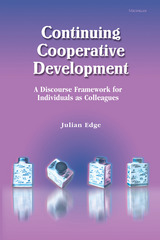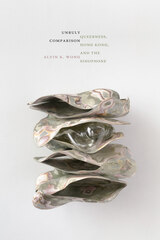2 books about Colleagues

Continuing Cooperative Development
A Discourse Framework for Individuals as Colleagues
Julian Edge
University of Michigan Press, 2002
In Continuing Cooperative Development, a series of guided tasks helps the reader acquire specific skills of listening and responding that, in turn, help a speaker to express and articulate thoughts and plans that lie just beyond what they knew that they knew.
By adopting a certain style of speaking and listening to colleagues for agreed periods of time, motivated professionals can take individual control of their own development and increase the feeling of collegiality in their workplace. Continuing Cooperative Development draws on Edge's experience of more than ten years using this framework worldwide and provides authentic examples to guide the reader. This interactive framework is demonstrated in the book as part of a reflective teaching approach in response to everyday classroom problems, and also as part of a more formal, action-research approach to the formulation of local educational theory.
The key theme of this book is the power of non-judgmental discourse to facilitate the development of ideas and action, accessing both cognitive and emotional intelligence. The transcribed and interpreted data of authentic interactions from the Americas, Europe, and Asia serve as evidence for the argument and as guidelines for implementation.
The work is set in the field of TESOL, although its relevance reaches across discipline boundaries. The teachers featured in the book have duties ranging from the instruction of young learners to the supervision of doctoral research. The common denominator is that these people are motivated educators, committed to extending their own understanding and developing their own style of being an aware professional.
[more]

Discovering Alvarez
Selected Works of Luis W. Alvarez with Commentary by His Students and Colleagues
Edited by Peter Trower
University of Chicago Press, 1987
Luis W. Alvarez has had a breathtakingly varied and important career of discovery, adventure, and invention. The winner of the 1968 Nobel Prize in physics for his work on subatomic particles, Alvarez participated as a scientific observer of the Hiroshima bombing mission, formulated the asteroid theory of dinosaur extinctions, discovered the radioactivity of tritium, took x-rays of the Second Pyramid at Giza, designed the Berkeley proton linear accelerator, first observed fundamental particle resonances, created the variable-focus thin lens, analyzed the Kennedy assassination film, and invented the Ground Control Approach radar system for airplane landings, to name but a few of his experiences and accomplishments.
Discovering Alvarez collects articles by this innovative physicist, documenting his outstanding contributions. The articles, which span his career, are accompanied by a remarkable collection of commentary by the colleagues and students who worked closely with Alvarez on each project or discovery.
Discovering Alvarez collects articles by this innovative physicist, documenting his outstanding contributions. The articles, which span his career, are accompanied by a remarkable collection of commentary by the colleagues and students who worked closely with Alvarez on each project or discovery.
[more]
READERS
Browse our collection.
PUBLISHERS
See BiblioVault's publisher services.
STUDENT SERVICES
Files for college accessibility offices.
UChicago Accessibility Resources
home | accessibility | search | about | contact us
BiblioVault ® 2001 - 2025
The University of Chicago Press









